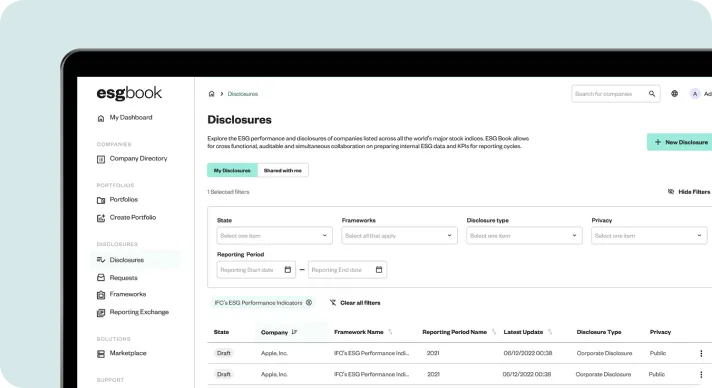Policy Digest: August 2025

Amid the reality of climate change and social and political polarization, global regulators are carefully evaluating the strengths and weaknesses of sustainability standards and regulations, as well as the conditions under which their potential can best be realized. In the August edition of the Policy Digest, we explore the rapidly evolving global policy landscape. International updates include the Basel Committee on Banking Supervision (BCBS) reinforcing physical risk assessment in credit risk management, the Science Based Targets Initiative (SBTi) launching a net-zero standard for financial institutions, and the International Financial Reporting Standards (IFRS) Foundation issuing industry-level guidance on selecting material disclosure topics.
In Europe, we see a flurry of regulatory activity following the Omnibus I package. The European Commission adopted the voluntary reporting standard for SMEs (VSME) as a delegated act under the Corporate Sustainability Reporting Directive (CSRD). Meanwhile, in a bid to further cut red tape around sustainability reporting, the European Financial Reporting Advisory Group (EFRAG) launched a consultation on a simplified version of the European Sustainability Reporting Standards (ESRS), and the European Commission opened a call for evidence to streamline reporting rules on industrial emissions, waste, and circular economy under the Environmental Omnibus. On the banking side, the European Banking Authority (EBA) issued a no-action letter clarifying the transitional provisions for ESG Pillar 3 reporting.
In the United Kingdom, the Financial Conduct Authority (FCA) updated climate and sustainability-related disclosure requirements for asset managers, regulated insurers, and pension providers to ease reporting burden and improve the usability of disclosed information. It also introduced new requirements for 'material' transition plans, aimed primarily at issuers of securities in regulated markets. Meanwhile, the UK Parliament highlighted findings on the production and sale of goods linked to human rights violations across supply chains, reinforcing the need for effective national due diligence rules.
Across the Atlantic, legal defense of the US SEC’s climate disclosure rule has been withdrawn. While consolidated lawsuits challenging the rule may proceed, the SEC has not indicated whether it would implement or reconsider the rule if those challenges were overturned. In better news, state-level policymaking remains strong, with California leading the way through newly released FAQs for companies reporting under SB 253 (Climate Corporate Data Accountability Act) and SB 261 (Climate-Related Financial Risk Act).
Finally, in Asia-Pacific, China released a new green finance taxonomy, while Nepal and the Philippines moved forward with plans to adopt and integrate the ISSB standards into their national frameworks.
These developments offer a snapshot of current policy action in sustainability and sustainable finance. The usual summer slowdown may yet be followed by new developments and surprises, as regulators have a long way to go before finalizing the direction of travel for sustainability standards and regulations globally.
.avif)
International
Basel Committee on Banking Supervision introduces methodology for physical risk integration
BIS Working Paper No. 1274 proposes a methodology to integrate physical risks, such as extreme weather events and gradual environmental shifts into banks’ existing credit risk models. By treating physical risk as a random trigger for sudden drops in asset values, the model helps estimate how these events affect default risk and potential losses. It keeps important features needed for regulatory consistency, making it a useful tool for banks and regulators to better account for climate-related physical risks in credit loss estimates, capital planning, and risk hedging. Read more
SBTi launches Financial Institutions Net-Zero Standard
The standard provides a credible science-based framework for financial institutions of varying sizes and complexities to align financial flows with net zero pathways no later than 2050. Banks may select appropriate targets, as defined, for net zero alignment of portfolios, utilizing engagement and investment levers to drive real-world transformation. Read more
Using ISSB Industry-based Guidance when applying ISSB Standards
The ISSB Industry-based Guidance consists of the SASB Standards and Industry-based Guidance on Implementing IFRS S2. The document provides useful information to primary users of general financial reports on identifying industry-relevant topics for sustainability disclosures. The Guidance is a useful tool to help organizations make materiality judgments related to sustainability risks and opportunities when disclosing under the ISSB Standards. It builds on the climate-related content from the SASB Standards, covering 68 industries, and is included as a non-mandatory appendix to IFRS S2 to support consistent and relevant industry-specific sustainability disclosures. The Guidance includes industry descriptions, disclosure topics, metrics, and technical protocols, and considers connectivity between financial and non-financial disclosures. Similarly, the IFRS has laid the foundation for interoperability with global sustainability reporting standards. Read more

Europe
European Commission announces the adoption of the VSME disclosure standard
The recently adopted standards are intended as a lightweight framework for SMEs. However, due to ongoing regulatory uncertainty surrounding the Omnibus, larger companies may also choose to adopt them in an effort to align with emerging requirements while balancing regulatory compliance and reporting burden. Despite the postponement of CSRD by two years, large leading companies may voluntarily report against the VSME in the interim which serves as the de facto reporting baseline until the ESRS is finalized. Read more
EFRAG Exposure Drafts on ESRS reduces reporting burden for in-scope companies
The European Financial Reporting Advisory Group (EFRAG) has launched a consultation on the Exposure Drafts of the European Sustainability Reporting Standards (ESRS), aiming to simplify and scale back requirements, with a 68% reduction in reporting metrics. Part of the Omnibus I package to streamline disclosures, the revisions are designed to make sustainability statements more accessible for both reporting entities and end users such as investors. While the reporting deadline for Wave One CSRD companies has been delayed by two years, the finalized ESRS will offer clearer guidance on core reporting obligations. Read more
EU’s Environmental Omnibus to streamline and cut red tape for circular economy and waste management regulations
Following deliberations on the Omnibus package, the European Commission has launched a Call for Evidence on an Environmental Omnibus. The initiative aims to ease the administrative burden for large companies and SMEs reporting under environmental legislation related to industrial emissions, circular economy, and waste management. This means reporting obligations under several regulations, including the Waste Framework Directive and the directive’s extended producer responsibility requirements (EPR) will be reconsidered. Regulations in other areas such as industrial emissions and waste management may also be streamlined under the Environmental Omnibus. The European Commission plans to adopt the proposal by Q4 2025. Read more
EBA issues no-action letter on Pillar 3 disclosures
The European Banking Authority (EBA) has issued a no-action letter regarding the application of ESG Pillar 3 disclosure requirements under its Implementing Technical Standards (ITS), in light of pending changes under the EU’s Omnibus package. It advises competent authorities not to prioritize enforcement of certain disclosure templates—specifically those related to the Green Asset Ratio (GAR) (Templates 6-8) and specific columns in Templates 1 and 4—for large, listed institutions and other entities newly brought into scope—until the amended ITS come into effect. Complementing this guidance, the EBA has updated its ESG risk dashboard using data as of December 2024. It reports a stable ESG risk environment across EU/EEA banks and notes that future iterations will reflect the adjusted enforcement stance. Read more

United Kingdom
FCA publishes review of climate reporting by asset managers, life insurers and regulated pension providers
The FCA has conducted a review of climate reporting efficacy which reveals mixed results. Asset managers reporting under the SDR have found the integration of climate change as a material risks impactful in terms of their risk management and overall strategies. This has enhanced transparency around climate risk management with clients and consumers. While climate-related disclosures are helpful for institutional investors, firms are receiving limited TCFD reports from retail investors, particularly at the product level, as the information required is quite granular. Other challenges include accessibility of reports on webpages, data collection for forward-looking disclosures (such as scenario analysis) and proportionality with multiple sustainability reporting requirements in effect (TCFD, UK SRS). In response, the FCA has updated its disclosure requirements and provided enhanced guidance to improve reporting efficiency. The streamlined version of the framework aims to ease compliance burden for firms, improve usability of sustainability information and ensure interoperability with global regimes. Read more
UK FCA issues disclosure requirements for ‘material’ transition plans
The UK FCA has released a Policy Statement outlining disclosure requirements under the new Public Offers and Admissions to Trading Regulations 2024, which effectively replaces the UK Prospectus Regulation. Issuers disclosing transition plans as material should provide a summary and the location of the disclosure as per the Annex requirements. The Annexes refer to the Transition Plan Taskforce (TPT) Disclosure Framework as a useful guide in identifying relevant disclosure information. Additionally, the Policy Statement includes a definition for the types of statements that will be subject to the liability regime for protected forward-looking statements (PFLS) and a new climate-related disclosure rule for certain equity issuers and optional disclosures for sustainability-labelled debt instruments. Read more
UK Parliament publishes Report on Forced Labour in UK Supply Chains
The Joint Committee on Human Rights launched an inquiry on human rights violations across the supply chain and found evidence of the sale of goods produced with forced labour in the UK. The Joint Committee has recommended mandatory due diligence requirements mirroring legislation in other jurisdictions such as the EU’s Corporate Sustainability Due Diligence Directive (CSDDD) and the US’ Uyghur Forced Labor Prevention Act (ULFPA). The UK currently does not have legislation to prevent goods linked to forced labour from entering into the UK market for sale or import. Thus, the report underscores a clear need for new legislation to establish due diligence requirements for corporates, an import ban on goods linked to forced labour and civil liability for companies that do not mitigate instances of forced labour in their supply chains. Read more

United States
Fate of the SEC’s Climate Disclosure Rule continues to hang in the balance
The SEC’s climate disclosure rule continues to be in limbo as the agency has not confirmed plans to enforce the rule if legal challenges against it are quelled. Earlier this year, the SEC withdrew its legal defense of the climate-risk disclosure rule. The SEC has requested the court to proceed with hearings on the consolidated lawsuits against the rule in the Eighth Circuit Court of Appeals. The agency has not indicated any plans to reconsider or revise the rule pending the legal outcome. Instead, it states that the court’s decision will help clarify the scope or necessity of further rule making and could set a precedent for establishing mandatory climate risk disclosure at the federal level. Read more
California releases climate disclosure FAQs for companies
The California Air Resources Board (CARB) is moving forward with the implementation of its dual corporate climate disclosure laws (SB 253 and SB 261) and has recently published FAQs to support first-time preparers ahead of the January 1, 2026 deadline. Under CA SB 253, companies with over $1 billion in revenue doing business in California must annually report their Scope 1, 2 and 3 emissions, starting in 2026. CA SB 261 additionally requires companies with over $500 million in revenue to disclose climate-related risks aligned with the TCFD global standard. The FAQs clarify that a firm date for Scope 1 and 2 reporting is yet to be determined, however, companies already collecting this data may start disclosing in 2026. This measure provides a respite to companies that may need time to set up processes and systems to collect emissions data. Meanwhile, the Scope 3 emissions reporting deadline is in 2027. The FAQs outline the timeline for obtaining third-party assurance of GHG disclosures, with limited assurance for Scope 1 and 2 emissions beginning in 2026 and reasonable assurance required by 2030. For companies reporting under CA SB 261, climate-related risks must be disclosed annually. The FAQs emphasize the inclusion of material risks—such as physical and transition risks—that could have a tangible impact on “immediate and long-term financial outcomes”. Read more

Asia-Pacific
China releases 2025 Green Finance Endorsed Project Catalogue
The People’s Bank of China (PBoC) has introduced a new Green Taxonomy that expands the types of activities and investments counted as green or environmentally friendly. For the first time, passenger rail is included, alongside a stronger focus on low-carbon industries, including energy conservation and carbon reduction, low-carbon energy transition as well as green services and trade. The Green Bonds Endorsed Project Catalogue will become effective in October and will replace the green lists in use for bond and loan markets, notably not covering equities. Read more
Nepal opens consultation on ISSB-aligned sustainability reporting standards
On July 16, 2025 the Nepal Accounting Standards Board (ASB) launched a public consultation to advance the incorporation of the IFRS S1 and S2 Standards into national sustainability reporting rules. The ASB is inviting feedback until August 16, 2025. The Nepal Financial Reporting Standards (NSRS) will be implemented in phases to allow first time reporting sufficient time for data collection, resources and awareness. Relief measures include Scope 3 exemption for first-preparers. These standardized sustainability standards aim to enhance comparability od sustainability disclosures to boost investor confidence and advance Nepal’s 204 net-zero commitments. The ISSB’s reporting framework is being actively adopted across more than 36 jurisdictions, enabling companies and financial institutions to remain globally competitive by ensuring alignment. Read more
Philippines Government announces plans to endorse ISSB-aligned disclosure standards
The Financial Supervisory Commissions (FSC) has opened a consultation on the adoption of Philippine Financial Reporting Standards (PFRS) on sustainability disclosures and issuance of reporting guidelines for publicly listed companies and large non-listed entities. The FSC is primarily considering interoperability with global standards and regulations with the aim to implement the ISSB-aligned standards (IFRS S1 and S2) from 2026. From 2027 onwards, the FSC will continue assessing and endorsing upcoming standards issued by ISSB. Read more

Other News & Resources
- WBCSD publishes new Guidance on Avoided Emissions v2.0:Drive Innovations and Scale Solutions Toward Net Zero. Read more
- New Nature Scenario Analysis for Resilient Business and Finance Chartered Accountants England and Wales. Read more
- UNEP FI releases Practical Guidance on Implementing Adaptation and Resilience for Banks. Read more
- IESBA publishes consultation on sustainability assurance engagements: Key Differences Between IESSA and Parts 1 to 4A of the Code; IESBA List of Prohibitions for PIEs in IESSA. Read more
- Japan FSA releases The Second Scenario Analysis on Climate-Related Risks (Banking Sector). Read more
- EBA publishes Working Paper Series on 'Bank lending implications of climate stress testing’ and ‘The impact of climate litigation risk on firms’ cost of bank loans’




